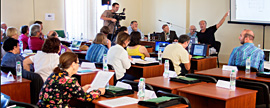The International Research Center for Traditional Polyphony was established in 2003 on the basis of Georgian Folk Music Department and the Laboratory of Secular and Sacred Music of Tbilisi State Conservatoire.
The conferences of 1984, 1986 and 1988 earned broad and unusual attendance for a peripheral part of the Soviet Empire given that not only Soviet but a large number of foreign scholars also took part in it. The tradition was impeded due to political and economical hardships of the post Soviet period. Tbilisi State Conservatoire restored the tradition in 1998. Next international conference was held in 2000 with the support of the Foundation “Open Society – Georgia”. Since then scientific forums such as these have been held biannually.
The participants of the First International Symposium on Traditional Polyphony 2002 – the celebrated ethnomusicologists and symposium guests including Mrs. Noriko Aikawa – then Director of the Intangible Cultural Heritage Section and a representative of the General Director of UNESCO at the time also supported the idea of establishing the Center of polyphony. Such great support finally resulted in the creation of the International Research Center for Traditional Polyphony in 2003.
The support from UNESCO turned out to be a key factor for the successful development of the Center. In 2003-2006 the Center developed the joint project of UNESCO and Japanese Funds-in Trust – “Safeguarding and Protection of Georgian Polyphony”, which provided the basis for the direction of the Center’s main activities.
The Center’s activities, on the one hand are directed, on the one hand, to stimulate research of world polyphony and increase its accessibility and on the other hand, to disseminate practical and scientific knowledge on Georgian polyphony on international arena. It aims to promote the research of polyphony phenomenon, peculiarities of regional styles and the place of Georgian polyphony in this context; to expand the borders of ethnomusicological studies and make the results of contemporary studies accessible to society. Publication of proceedings of International Symposia on Traditional polyphony serves this purpose.
Besides, the Center constantly seeks for old recordings of Georgian traditional music and publishes them.
Researches on Georgian, Bulgarian, Albanian, North Caucasian, Austrian, Ukrainian, Croatian, Serbian, Macedonian, Italian, French, Basque, Corsican, Tanzanian, Slovak, Slovenian, Polynesian, Amis people of Taiwan, Pygmies of Central Africa, Banda Linda, Ethiopian, Kyang and Yi peoples of China, Aba and Almay of Tibet, Nuristan, Ainu of Japan vocal polyphony and instrumental polyphony of South-East Arabia, Island of Bali, Azerbaijan and Turkey were presented at the Tbilisi Symposia in 2002, 2004, 2006, 2008, 2010, 2012 and 2014.
Polyphonic examples of almost all afore-mentioned polyphonies were presented at the concerts accompanying Symposia as performed by the tradition bearers.
Thanks to the symposia the Center became friends with the world’s eminent ethnomuiscologists – Izaly Zemtsovsky (USA/Russia); Dieter Christensen (USA/Germany); Simha Arom (France); Franz Foedermayr (Austria); Susanne Ziegler (Germany); Daiva Raciunaite-Vyciniene (Lithuania); Polo Vallejo (Spain) and others, who expressed their support during years with their multiple participation in the symposium.
The Center is proud of the friendship and collaboration with the ensembles of Georgian polyphony outside Georgia: “The Kartuli Ensemble”, “Maspindzeli”, “darbazi”, “Zari”, “Yamashirogumi”, “Marani”, “Doluri, “Jamata”, “Gorani” “Utskho suneli’’; in the comments they underline the fact that for them Georgian polyphony is the best means of relation, this is why regardless of the time and expenses they participate in symposium concerts, travel around Georgia and popularize our national culture abroad. The Center is a member of the European seminar (ESEM), and collaborates with the International Council for Traditional Music (ICTM).
During its history the Center has realized various local and international projects – In 2005 with the help of Vienna Phonogrammarchiv the Center transferred the wax cylinder recordings made in Georgia in the 1920.s-1950s on to digital media; in 2006-2008 with the support of the Ministry of Culture, Monuments Protection and Sport of Georgia the Center published the catalogue and 16 CDs entitled “Echoes from the Past “. Together with American Nova Science Publishers the Center published the collection “Echoes from Georgia: 17 Arguments on Georgian polyphony” in 2010; and “Echoes from the Past: Georgian Prisoners’ songs recorded on wax Cylinders in Germany 1916-1918” together with Berlin Phonogramm-Archiv in 2014.
At various times among the employees of the Center were ethnomusicologist Tamaz Gabisonia, Ketevan Baiashvili, alongside the Center’s employees engaged in the projects were ethnomuiscologists Nino Kalndadze-Makharadze, nino Nakshidze, Ketevan Matiashvili, Davit Shughliashvili, Malkhaz erkvanidze, Otar Kapanadze, Lela Makarashvili and others.
Semi-annual online Bulletin, published in June and December, is available on the Center’s Web Site. The Center also realizes a short (10 month) certification educational program “Georgian Folk Music Art” for foreigners.
By the decision of the Representative Council of the Conservatoire of October 2, 2023, the TMCTS was granted the status of an independent scientific-research unit. From October 2, 2023 to the present, the International research Center for Traditional Polyphony is an independent scientific-research unit of the Tbilisi State Conservatoire (hereinafter referred to as the “Center”).
The Center is guided in its activities by the current legislation, the Charter and Regulations of the Conservatoire, approved by the Resolutions of the Academic Council of February 16, 2024 # 07/2024 and the Representative Council of February 21, 2024 # 5; (Amendments were made by the Resolution of the Academic Council of May 16, 2024 # 19/2024 and approved by the Resolution of the Senate of June 5, 2024 # 9).




